Malala and Satyarthi receive Nobel Prize
Yousafzai would like to be PM
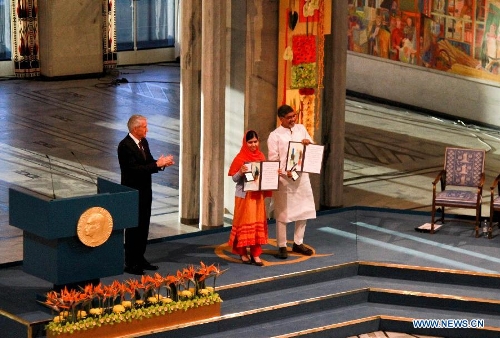
Kailash Satyarthi (1st R) and Malala Yousafzai (2nd R) present their medals during the Nobel Peace Prize awarding ceremony in Oslo, Norway, Dec. 10, 2014. Kailash Satyarthi and Malala Yousafzai, two child welfare activists from Indian and Pakistan respectively, on Wednesday received the 2014 Nobel peace prize. (Xinhua/Liu Min)
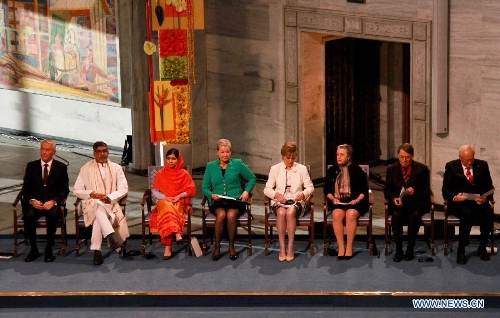
Kailash Satyarthi (2nd L) and Malala Yousafzai (3rd L) attend the Nobel Peace Prize awarding ceremony in Oslo, Norway, Dec. 10, 2014. Kailash Satyarthi and Malala Yousafzai, two child welfare activists from Indian and Pakistan respectively, on Wednesday received the 2014 Nobel peace prize. (Xinhua/Liu Min)
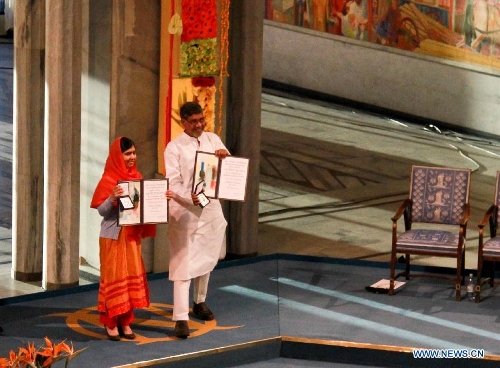
Kailash Satyarthi (R) and Malala Yousafzai present their medals during the Nobel Peace Prize awarding ceremony in Oslo, Norway, Dec. 10, 2014. Kailash Satyarthi and Malala Yousafzai, two child welfare activists from Indian and Pakistan respectively, on Wednesday received the 2014 Nobel peace prize. (Xinhua/Liu Min)
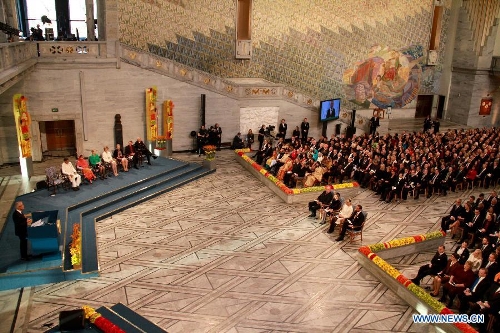
Photo taken on Dec. 10, 2014 shows a view of the awarding ceremony of 2014 Nobel peace prize in Oslo, Norway. Kailash Satyarthi and Malala Yousafzai, two child welfare activists from Indian and Pakistan respectively, on Wednesday received the 2014 Nobel peace prize. (Xinhua/Liu Min)
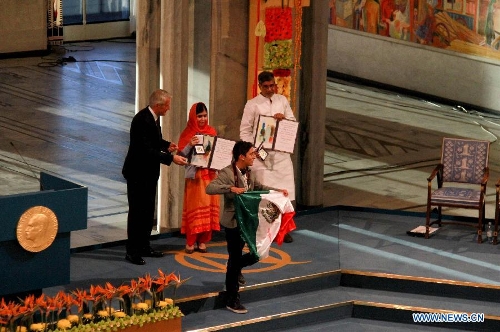
A man (front) holding the Mexican flag disturbs the Nobel Peace Prize awarding ceremony in Oslo, Norway, Dec. 10, 2014. Kailash Satyarthi and Malala Yousafzai, two child welfare activists from Indian and Pakistan respectively, on Wednesday received the 2014 Nobel peace prize. (Xinhua/Liu Min)
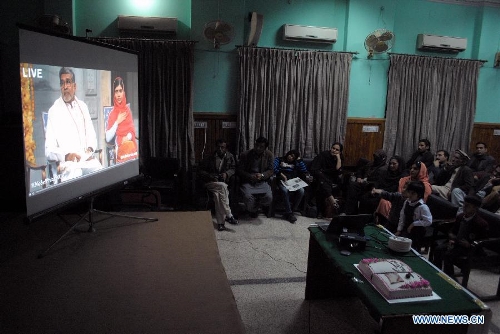
Pakistani people watch a live broadcast of the award ceremony of joint Nobel Peace Prize laureate in Peshawar, Pakistan, Dec. 10, 2014. Kailash Satyarthi and Malala Yousafzai, two child welfare activists from Indian and Pakistan respectively, received the 2014 Nobel peace prize on Wednesday . (Xinhua/Umar Qayyum)
Pakistani schoolgirl Malala Yousafzai received the Nobel Peace Prize on Wednesday as the youngest ever laureate, sharing her award with Indian child rights campaigner Kailash Satyarthi.
"A young girl and a somewhat older man, one from Pakistan and one from India, one Muslim, the other Hindu; both symbols of what the world needs: more unity. Fraternity between the nations!" Thorbjoern Jagland, chairman of the Norwegian Nobel committee, said at the ceremony in Oslo.
Malala, 17, became a global icon after she was shot and nearly killed by the Taliban in October 2012 for insisting that girls had a right to an education.
Malala has already been honored with a host of awards, standing ovations and plaudits everywhere from the United Nations to Buckingham Palace.
On the eve of the ceremony, she said she would not rest on her laurels, saying she would like to one day become prime minister of her native Pakistan.
"If I can serve my country best through politics and through becoming a prime minister then I would definitely choose that," she told the BBC.
"I want to serve my country and my dream is that my country becomes a developed country and I see every child get an education."
Minutes after Malala received the prize, a man carrying a Mexican flag walked towards her, but was caught by security. His motives were unknown.
Before the ceremony, Malala and Yousafzai met with 7,000 Norwegian children aged between six and 14 in the heart of Oslo. "You have given me so much energy. It's more than a Red Bull [high-caffeine drink]!" Malala said.
At a press conference in Oslo on Tuesday Malala said that in many parts of the world, children's requirements are infinitely more modest than an "iPad or computer."
"What they are asking for is just a book, just a pen, so why can't we do that?"
Satyarthi, 60, was recognized by the Nobel committee for his 35-year battle to free thousands of children from virtual slave labor. "I refuse to accept that the world is so poor, when just one week of global military expenditure is enough to bring all of our children into classrooms," he said after receiving the prize.
"I refuse to accept that the shackles of slavery can ever be ... stronger than the quest for freedom."